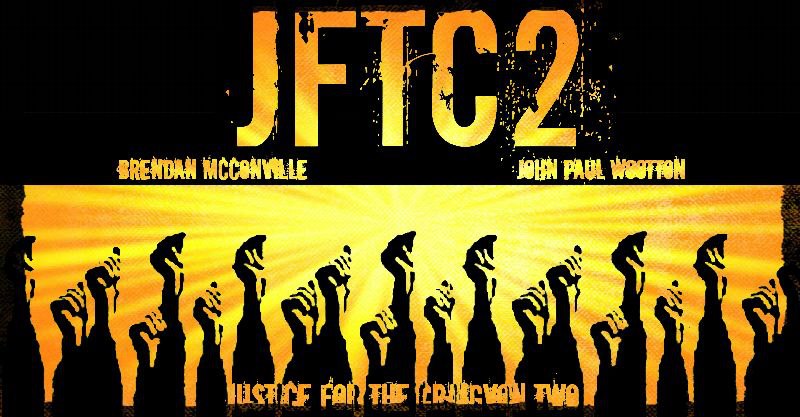La Corte Suprema britannica ha respinto le richieste di appello presentate per due importanti casi: quello dei Craigavon Two, incarcerati per la morte del poliziotto Stephen Carroll, e quello del lealista Winston Rea, contro la richiesta dei nastri del Boston College
Il tribunale ha respinto la richiesta di presentare appello contro la sentenza dei due uomini ritenuti colpevoli della morte di un poliziotto.
Brendan McConville e John Paul Wootton – conosciuti come i Craigavon Two – sono stati condannati per l’omicidio dell’agente PSNI Stephen Carroll, avvenuta a Craigavon nel marzo 2009.
In questo caso i giudici hanno detto di respingere il permesso di un appello “perché la richiesta non ha sollevato un punto sostenibile di diritto di interesse generale, che dovrebbe essere considerato dalla Corte Suprema in questo momento, tenendo presente che il caso è già stato oggetto di decisione giurisdizionale e rivisto in appello”.
Entrambi gli uomini attualmente stanno scontando l’ergastolo per l’omicidio di Stephen Carroll, il primo membro della PSNI ad essere ucciso.
Lo scorso ottobre la Corte d’Appello ha aumentato la pena minima da passare in carcere per John Paul Wootton da 14 a 18 anni, dopo aver stabilito che la pena era troppo clemente.
Brendan McConville dovrà passare in prigione almeno 25 anni.
I Craigavon Two hanno perso l’appello contro le condanne nel maggio 2014. La decisione della Corte Suprema significa che la sentenza della Corte di Appello era corretta.
Invece il lealista Winston Rea ha perso il suo tentativo di fermare la polizia dall’ottenere i nastri contenenti le interviste rilasciate al Bonston College per il Belfast Project.
L’ex lealista Winston Rea è stato uno delle decine di ex paramilitari che hanno fornito testimonianza orale al Belfast Project, per raccogliere le voci di chi ha vissuto in prima persona i Troubles.
Le interviste furono concesse, fermo restando che i nastri sarebbero stati resi pubblici solo dopo la morte degli intervistati.
Tuttavia, nel 2013, gli ufficiali PSNI che indagavano sul rapimento, l’uccisione e la sepoltura segreta di Jean McConville, la più famosa dei Disappeared ottennero le trascrizioni dell’intervista rilasciata dalla repubblicana Dolours Price.
Quel materiale venne consegnato dopo battaglie giudiziarie su entrambi i lati dell’Atlantico.
Winston Rea ha cercato di fermare la polizia nordirlandese dall’ottenere la sua testimonianza.
Quando la Corte di Appello di Belfast ha respinto le richieste di Rea, secondo il quale la consegna delle interviste violerebbe il suo diritto alla privacy, ha portato il suo caso davanti alla Corte Suprema.
Tuttavia i giudici hanno rifiutato il permesso di fare appello, stabilendo che il caso non solleva un punto sostenibile di diritto di interesse generale.
Gli avvocati di Winston Rea hanno preannunciato la presentazione di una domanda urgente davanti alla Corte Europea dei Diritti dell’Uomo di Strasburgo.
Tratto da Portadown Times
Supreme Court rejects Carroll murder appeal bid
The UK’s highest court has rejected applications to hear appeals on two high profile cases including that of the Craigavon Two who were convicted of the murder of Constable Stephen Carroll.
The court rejected an application to hear an appeal over the sentencing of two men for murdering a policeman.
Brendan McConville and John Paul Wootton were convicted of murdering Stephen Carroll in Craigavon in 2009.
In this case the judges said they were refusing permission to appeal “because the application does not raise an arguable point of law of general public importance which ought to be considered by the Supreme Court at this time, bearing in mind that the case has already been the subject of judicial decision and reviewed on appeal”.
Both men are currently serving life sentences for murdering Constable Carroll, who was the first member of the PSNI to be killed.
The Court of Appeal increased Wootton’s minimum jail term from 14 to 18 years last October after ruling it was unduly lenient.
McConville is serving at least a 25-year-sentence for the murder.
Both men lost their appeals against their convictions in May 2014. The Supreme Court’s decision means that the Court of Appeal’s ruling stands.
And loyalist Winston Rea lost his attempt at the Supreme Court to stop police getting tapes of interviews he gave to Boston College’s Belfast project.
In the case of Winston Rea, the former loyalist prisoner was one of dozens of former paramilitaries who provided testimonies to Boston College’s Belfast Project.
The interviews were given on the understanding that tapes would not be made public until after the deaths of the interviewees.
However, in 2013 detectives investigating the 1972 abduction and murder of Belfast mother-of-10 Jean McConville secured transcripts of former IRA woman Dolours Price’s account.
That material was handed over following court battles on both sides of the Atlantic.
Mr Rea wanted to try to stop the police in Northern Ireland from obtaining his testimony.
When the Court of Appeal in Belfast rejected Mr Rea’s claims that handing over the interviews would breach his right to privacy, he took his case to the Supreme Court.
However, judges refused permission to appeal, ruling that the case does not raise an arguable point of law of general public importance.
His lawyers say they will now make an application for an urgent hearing at the European Court of Human Rights in Strasbourg.
